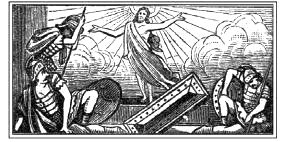
| Contents | Ecce iam noctis Lo! The Dim Shadows of the Night |
Hymni |

Attributed to Pope St. Gregory the Great (540-604), but some think it may be a later composition by Alcuin (732-804). In the current Liturgia Horarum it is used for Laudes for the Sundays of the second and fourth weeks of the Psalter during Ordinary Time. In the Roman Breviary it is used for Lauds on the fourth and subsequent Sundays after Pentecost until September 27 inclusive.
|
| ECCE iam noctis tenuatur umbra lucis aurora rutilans coruscat; nisibus totis rogitemus omnes cunctipotentem,1 |
LO! the dim shadows of the night are waning; radiantly glowing, dawn of day returneth; fervent in spirit, to the mighty Father pray we devoutly. |
| Ut Deus, nostri miseratus, omnem pellat angorem, tribuat salutem, donet et nobis pietate patris regna polorum.2 |
So shall our Maker, of His great compassion, banish all sickness, kindly health bestowing; and may He grant us, of a Father's goodness, mansions in heaven. |
| Praestet hoc nobis Deitas beata Patris ac Nati, pariterque Sancti Spiritus, cuius resonat per omnem gloria mundum. Amen. |
This He vouchsafe us, God for ever blessed, Father eternal, Son, and Holy Spirit, Whose is the glory which through all creation ever resoundeth. Amen. |
| Latin from the Liturgia Horarum. Tr. by Rev. Maxwell Julius Blacker (1822-1888). Changes made by Pope Urban VIII in 1632 to the Roman Breviary: 1 ... / lux et aurorae rutilans coruscat:/ supplices rerum Dominum canora voce precemur. 2 Ut reos culpae miseratus omnem/ pellat angorem, tribuat salutem,/ donet et nobis sempiternae munera pacis. |
<- Prev |
Next-> |
